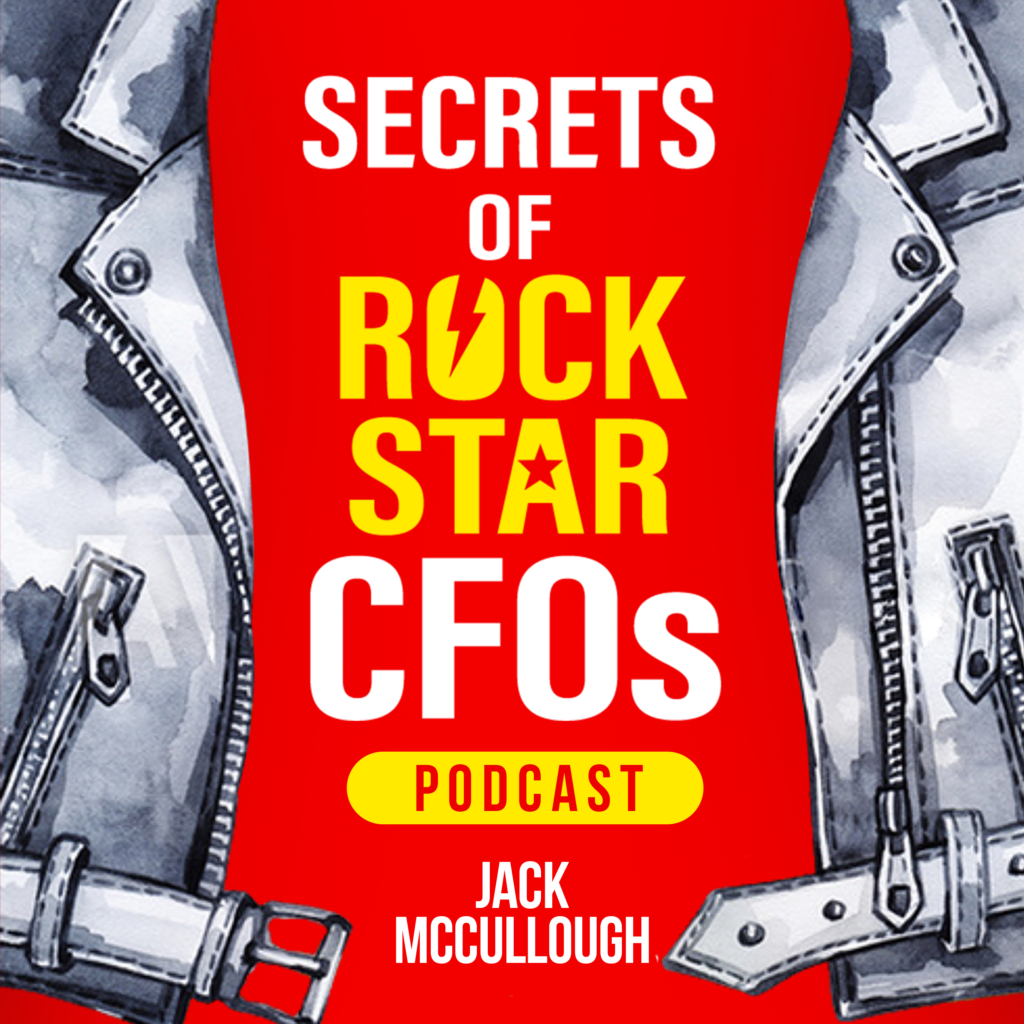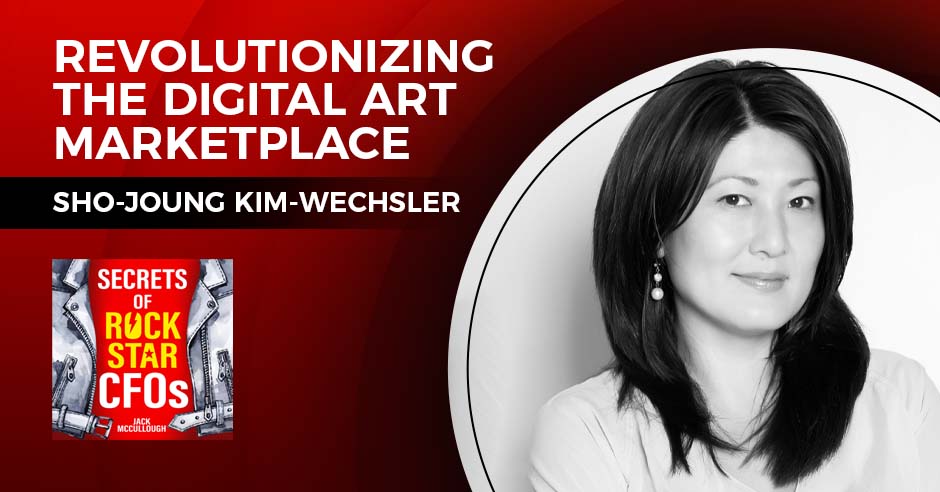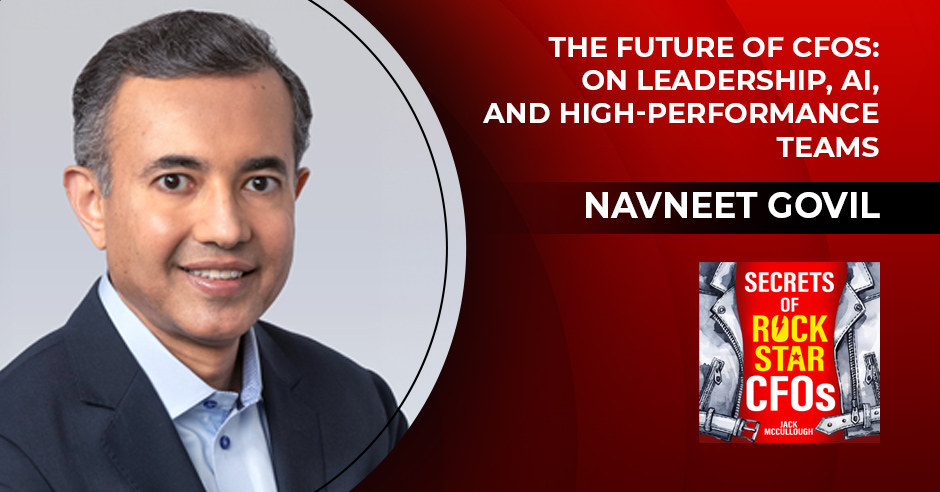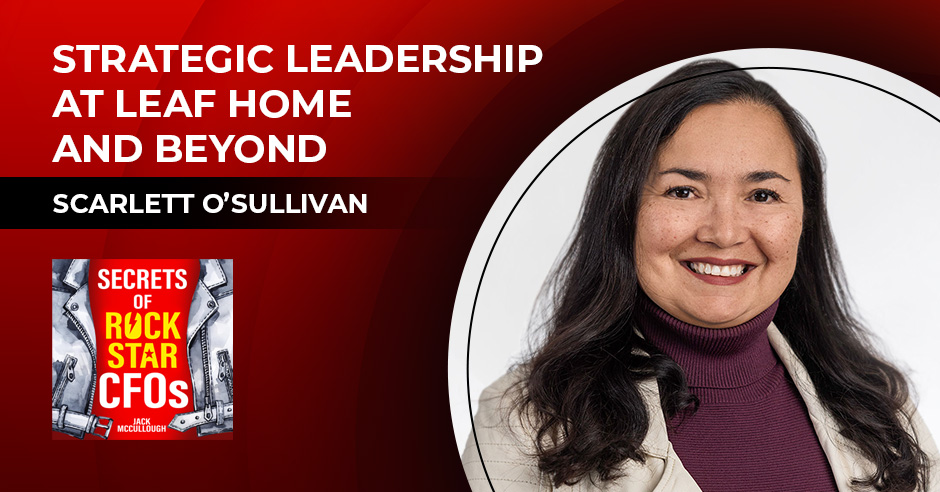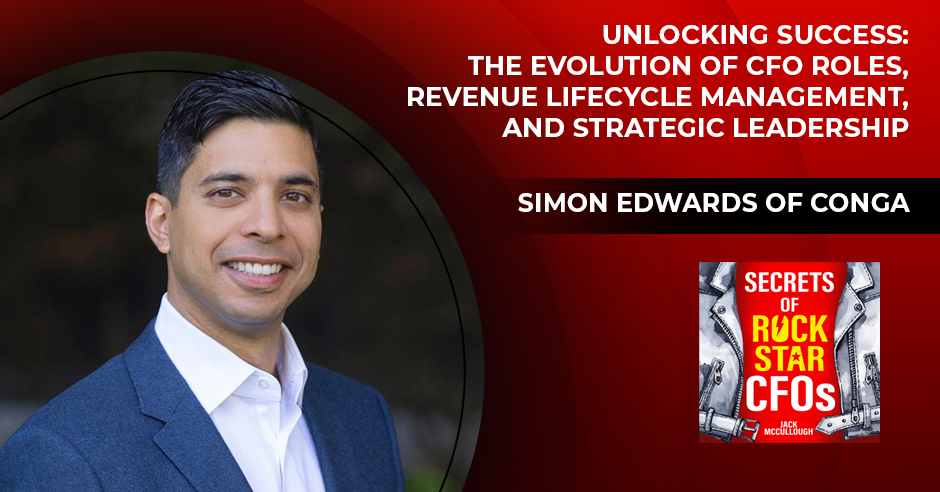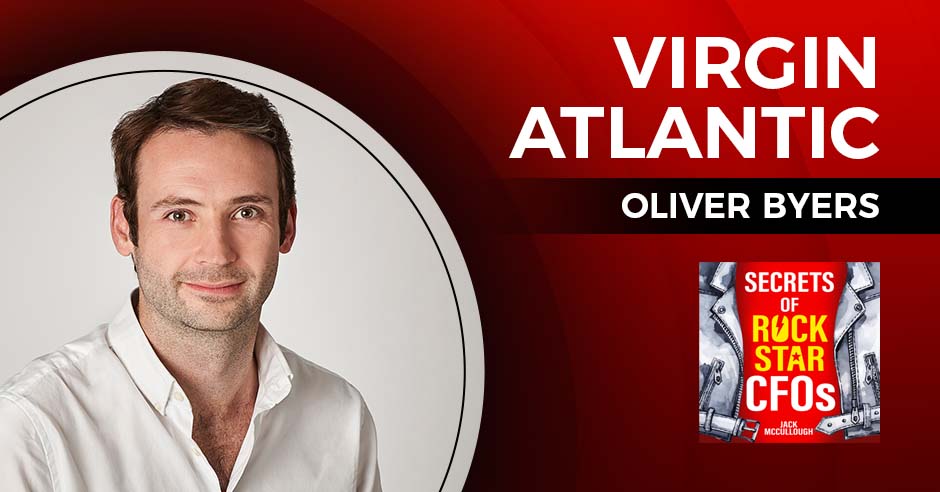Johnson & Johnson is one of the most recognizable names in business. But the J&J brands that sit on your shelf at home, Tylenol, Band-Aid and Neutrogena, now belong to a new company—Kenvue. The separation of the $15 billion dollar titan was no easy decision for EVP and CFO Joe Wolk, but one that will continue to shape the company’s trajectory.
Wolk joins Jack McCullough to discuss the separation, as well as his insights into a career in finance and why J&J isn’t just his work, it’s also his family. Listen by clicking below. The Q&A, lightly edited and trimmed for clarity, follows.
—
Listen to the podcast here
My guest is Joe Wolk. Joe is the CFO of a company you might have heard of called Johnson & Johnson. Joe, welcome to the show.
Jack, it’s a pleasure to be here with you. It’s nice to speak with you again.
Your company is about as much of a household name as any company could be. I’m not going to ask you what Johnson and Johnson does, but can you give us an overview of some of the big things that are going on right now at J&J?
It’s probably a good time to ask that question. As many on the podcast audience may know, we have separated out our consumer health business. Although it was the smallest part of Johnson & Johnson, it was the most recognizable. Brands like Tylenol, Aveeno, Neutrogena, Listerine, Band-Aid and things that many people have in their medicine cabinets at home are now a separate company known as Kenvue. We had the opportunity to separate that successfully over the last several years.
We’re focused on pharmaceuticals or what we call innovative medicines, specializing in areas like oncology, immunology, neuroscience and med tech. Think about hospital procedures, cardiac ablation, orthopedic knee and hip replacement systems, vision care with contact lenses and surgical options. We are somewhat of a different company than what most people would have in mind when they hear the term Johnson & Johnson.
I have every single one of those brands in my house. I’m a fairly typical American in that sense. The impact of the company Kenvue, even though that company is not yet well known, it’s remarkable what they’re doing. Yet, Johnson & Johnson is the bigger company.
We believe we’ve positioned them for success. Those are household brands. For them to be a new startup company with the legacy and pedigree that some of those brands carry is a tremendous advantage for them. I look forward to seeing them win in the marketplace soon.
I want to get into your early years. Where did you grow up?
I grew up in Edison, New Jersey. It’s about five miles from the headquarters in New Brunswick, New Jersey, for Johnson & Johnson.
I knew that because when you spoke at MIT, I thought it was fascinating. Johnson & Johnson is more than a job for you. You have a little bit of a history.
If you look at my bio, it’ll say I’ve been at the company for 26 years this May 2024, but I had the pleasure and the benefit of knowing the company much longer than that. My dad worked on the factory floors at one of the operating units. He got the job because his brother, who was on that same factory floor, helped him get the job. I had an administrative assistant who was an aunt for the Ethicon division. There is a lot of family history there. Additionally, my mom worked in healthcare as a nurse for several years at a hospital about three blocks away from Johnson & Johnson headquarters.
This has been a great experience, professionally. There’s something more personal for me. I can recall the first time I was announced as the CFO of the company. Back then, prior to the pandemic, a big meeting was held for shareholders. The board and the management team partitioned off with one of those velvet ropes, as you can imagine. Ten minutes after the program ended, there was an old lady who was standing behind the velvet rope, smiling at me with a big smile. It was one of the women with whom my dad had worked back in the day.
Whenever things get rough here at J&J, I have more than professional motivation. There’s a personal motivation because not only was she somebody in the community, not only a shareholder, not only somebody who worked with my father and was an employee of the company, but also somebody who at that age was using one of our products. We benefit greatly by working in an industry that’s so personal. You think about healthcare. If it’s not ourselves, it’s somebody close to us who’s going to experience some affliction. Even in finance at Johnson & Johnson, we can be part of that solution. It is satisfying.
That’s such a cool story, to think of your dad and your uncle working on the factory floor, and you’d be running the entire finance organization for the company several years later. That’s amazing.
They’d both be mad at me because they worked on a consumer factory floor. Now that we’ve separated them off they might take issue with me at this point, but I think they’d still be proud even though they’re long gone at this point.
Did you recognize the woman who recognized you?
I did. That’s the perspective I have. We used to call Johnson & Johnson the family of companies. It’s a company for families. That woman used to attend my seventh and eighth-grade basketball games. That’s how close-knit the community was here in Central Jersey when it came to Johnson & Johnson employees. You can go to a little league game or religious services, and you’d likely run into a Johnson & Johnson employee. When I had the opportunity to come here, it was special.
I want to chat about your career path, which is quite interesting. You studied business, but you also got a law degree. You told me previously that you never were a practicing attorney, but how do you think having that educational background affect you as a CFO?
I never practiced. I worked as an accountant or financial analyst during the day and went to school four nights a week. I realized early on I wasn’t going to be an attorney because I was enjoying the full-time day job. I valued the Socratic method and the way they approach problems. If you think about it, they have an issue, they apply some rule of law, they apply the fact pattern and they come to some conclusion. That same model is applicable to business problems. I’ve been able to use that throughout my career to help get to a better answer in many cases. Sometimes, it’s about asking the right question, and lawyers certainly can do that.
Joe, one thing I’ve noticed along the way is almost every great CFO I’ve spoken to has had influential mentors along the way. I’m wondering if, when you look back upon your career progression, are there any people that stick out that you learned a lot from?
It’s such a poignant question because I’m the benefactor. I had the good fortune of working for many good people throughout my career. A lot of people focus on the job content, but it is an underappreciated element when somebody is taking a new role. Who am I going to be working with? Who am I going to be working for?
It’s had a profound impact on my career. I’ll run through a quick inventory of those that come to mind. I’m going to leave somebody out. I’ll apologize in advance to that individual or two. In my early days, when I started with a company known as AMETEK, there was a gentleman named Bobby Anarell. He’s close to the end of his career. He took a chance on a kid who put me in business situations I had no business being in. He kept me grounded.
At the time, the vogue thing was not to take your next job until you knew what that was going to lead to after that. I brought that philosophy to him. He slouched in his chair a little bit, furrowed his brow, bridged his glasses down and said, “I don’t know. In my day, I used to do a good job with the one I had, and things usually worked out.” It was such grounding advice that sticks with me now and has stuck with me throughout my career.
Another gentleman who was the CFO of that organization, John Molinelli, was astute. You’d hand him a 50-page report that he’s never seen before. He’d be able to go to page 47 and find the error that was in the report, but it was uncanny the way he could do that. He also taught me that numbers can and should tell a story. There’s more than meets the eye than the statistics that are on a piece of paper.
The gentleman who had the conviction for hiring me during a hiring freeze here at Johnson & Johnson 26 years ago, Pete Batesko, said, “Always prepare, have a plan and then a backup plan because something always goes wrong with the plan.” Resiliency was something that I took from him.
Michelle D. Young, who was a supply chain leader, not a finance leader, I walked into her office, I was about two months into the role, and said, “Michelle, I think you’ve got the wrong guy for the job.” It was in the med tech supply chain. We were trying to consolidate some of our efforts there. These folks all come in with a personal bias towards the particular divisions from which they represent. She goes, “That’s why we need you. The objectivity that you can bring, particularly through a finance function, is what’s going to help us be successful.”
I go to the two CEOs that I’ve had the pleasure of serving under during my current tenure. Alex Gorsky took a chance on me when I wasn’t the odds-on favorite to get this role. He taught me that being disciplined about your work ethic matters in higher-level roles because the organization is watching. The organization has a certain amount of respect when they sees somebody at the highest level working hard.
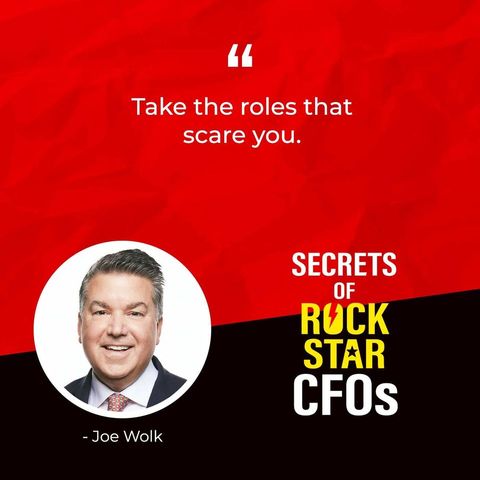
Joaquin [Duato] is a hard worker. I had the pleasure of working with him in a number of roles as I grew up in Johnson & Johnson. Because people are watching, even though things might be going against you or against the company, projecting optimism is crucial to ensuring that the organization has the right tone, tenor and gumption to say, “We can handle anything.”
Those are some of the folks. I’m sure I left a few folks out, but you can see I’ve been fortunate to have worked with many great people, all with different perspectives. The thing that I would leave your audience with is don’t ever try to emulate one person. All this stuff that I’ve talked about, I try to make it my own and fit it into my portfolio. I don’t do everything right, but I try to do the things that I’ve learned from those folks but not try to be those folks.
One thing I’ve noticed about you, Joe, is that in our conversations and when you spoke at the MIT event, you never take credit for anything. You’re one of those people who say “we,” “us” and “team” quite a bit. You never take credit for anything that you’ve accomplished in your career. I’m curious about the team that you’ve built and led at Johnson & Johnson. What’s your philosophy for building a world-class finance team?
If you ever catch me not giving credit to the team, make sure you correct me, Jack because I’m blessed to work with a great team. It’s fun to watch them work. They’re not territorial. They run to the problem. They say, “How are we going to figure this out for Johnson & Johnson and Johnson & Johnson Finance?” Finding the right people is critically important, but one of the things that build a great finance team is you have to have a healthy respect and appreciation for the debits and credits. That is our ticket to entry and being able to make sure that we are on solid footing. Our reporting and our analysis are accurate and instill confidence in the rest of the business.
One of the mantras we have in Johnson & Johnson Finance, and I can’t take credit for this, it predates me, even my predecessor, but we fashion ourselves as business leaders with finance expertise. That’s critically important. With finance expertise, I explained debits and credits. Having the business sense and understanding that problem-solving is also part of your remit is critically important, and I think why the rest of the business values the finance function here at Johnson & Johnson.
I’ll also add that it’s what makes the role fun, when you can understand. With accounting debits and credits, it doesn’t always matter what the widget is. You’re going to record it. It doesn’t matter how many commas are in the number. If you got that right, that’s good. In our business, it’s critically important to understand—”How we can get to a new patient population. How can we help business leaders see around corners?” We bring that level to the finance function of objectivity.
I always say, “I want my commercial folks to believe they can sell anything. I want my R&D folks to believe they can invent anything.” I want to bring it with the finance function to some normalcy of truth. What does the analysis tell you that is likely to happen? Not that that’s always the dispositive answer. For strategic reasons, you may go after that moonshot, but often, it’s a good and critical part of the dialogue when making business decisions.
A friend of mine, Judy Romano, she’s a successful CFO. She always says, “I’m not a financial executive. I’m an enterprise-wide executive who happens to be an expert in finance.” It’s a good way of framing it. You frame it the same way with your team. The pride that you have in the team leaped off the page when you were talking at MIT.
It’s an immense pride that we have a fantastic group of individuals. That’s where it starts. They’re good people to begin with. There’s a level of trust and camaraderie. I like when people leave the finance function and run a different part of the business. Several years ago, people would leave the finance function and never come back. They must have been smart because they never came back to the grind of finance. Now we’re getting people back. They come back with different perspectives. They are living into this, “I’m a business leader with a finance expertise.”
If I think down the road, maybe even it’s here now, you see functions starting to meld together. Leadership teams are about solving problems, not like, “This is the accounting, HR and IT answer.” It’s more about how we get some great minds together to make good decisions based on credible data. Knowing that it’s based on assumptions and assumptions will change and move forward. That’s how I see the role of business leaders evolving. It has evolved, but it will continue to evolve, especially as we get more adept with technology and different sources of information.
How big is your finance team and a finance accounting team globally?
Across the globe, we have 6,500 people dedicated strictly to finance. We have another 3,500 people in our global services functions, which cover not only areas of finance but also IT, HR and procurement.
I want to talk about Johnson & Johnson. First of all, the top five recognized logos in the world. There’s Disney, Apple Computers and the American Red Cross, but I can’t think of many that are better recognized than J&J’s logo. It’s a positive thing. Ask people, “What’s the company in the world that you trust the most? What’s the most respected brand in the world?” It’s in everyone’s conversation. As a member of the leadership team, how do you live day to day to make sure that you’re honoring that trust that we all have in you?
Jack, it’s a non-negotiable at Johnson & Johnson. It’s embedded in our credo document. I don’t know if you or your audience have had the chance to look at it. It’s four quick paragraphs. It was devised many years ago by the grandson of one of the founding Johnson Brothers, Robert Wood Johnson. He penned it a few weeks before the company went public on the New York Stock Exchange. He simply laid it out in four paragraphs. He’s like, “Here are our responsibilities. Here’s what we’re about as a company.”
That first paragraph addresses the patients, the physicians, the mothers and the fathers who we intend to serve and make their lives better. The second paragraph focused on employees and employee welfare. They were making sure that they got a fair wage and adequate benefits. This was at a time when there were struggles between labor and management. Back in the 40s, it was profound and somewhat of a visionary to put that in and say, “We’re going to need to treat employees right so they feel fulfilled by their job.” The third paragraph focused on the communities in which we live and work. The fourth paragraph talked about shareholder return. In my mind, it was ESG to a large extent before ESG even glimmered in someone’s eye.
What I like about the document is the word “must” appears more than twenty times. That’s an unambiguous, unequivocal word. It doesn’t say, “We’ll leave that to chance.” It creates a healthy tension. You have to find the right balance between all those constituents. It’s clarifying. Personally, I make decisions by looking at that and saying, “What’s the right thing to do?” Even if it’s going to mean something that’s maybe not the most profitable thing.
That’s a great point. The word must. Even if you placed it with should, that’s a different level of commitment. I have noticed sometimes with people when you issue guidelines like these are our travel guidelines, I don’t have to follow them. They’re guidelines. It’s like you’re missing the point.
While it’ll be in every conference room I go to, no matter where I go in the world, the credo is more than words to folks across the 130,000-employee base here at Johnson & Johnson. They try to live and breathe it. We try to live into it by taking a survey on an annual basis, assessing management’s ability and capabilities to live in those words. It’s known as our credo survey. It’s not the average survey that gets a 10 or 15 percent response rate. Response rates for this on an annual basis are 93 percent. That’s not uncommon. The employees look to be heard. They want to improve the environment but also want to hold people accountable for making sure that the environment exists to begin with.
You take a lot of pride in J&J and its sense of global citizenship. You’re committed to sustainability, DEI and a lot of other initiatives beyond being profitable. What are some of the ones that you are most excited about and proud of?
The world suggests that everybody needs to opine on everything. I don’t know that we take that approach. When it comes to healthcare-related matters, it’s about creating good access for patients who need them, pushing the envelope when it comes to innovation and realizing that there are going to be some failures along the way, which doesn’t fit nicely into any financial model. That’s part of the business we’re in.
One of the areas that I’ve had the pleasure of being part of since it started back in 2019 is our Johnson & Johnson Impact Ventures Group. It’s trying to deploy investment in a way that garners our return but is underinvested in terms of helping populations around the world that don’t quite have the same level of access to medicine.
These are people who want to start a business and trying to raise some capital. We have a team focused on looking at those as investment opportunities. We are expecting a return but not a return for return’s sake. It’s a return, so we can funnel that money back into future investments. You think of the welcome trust over in Europe. It started from that platform. We’ve got $50 million dedicated at this point and fund it. The team has invested about 60 percent of that amount at this point. It’s still in its infancy, but that’s one way where you can do well by doing good.
One thing I want to touch about it is data, technology and finance. You mentioned making decisions that are supported by data. How are you leveraging technology and data resources to make better decisions, financial and otherwise?
I would partition it and our CIO, Jim Swanson, into two camps. In one camp, we’re getting good. I’m speaking for Johnson & Johnson, but also more broadly across the industry. That’s in the productivity and predictability of things. If I take it from the employee perspective, personalizing learning and development tools and curriculum and doing that online based on the career they’ve had, the career they hope to have and their educational experience, melding that all together to give them a platform by which, “Here are our areas that may not only be of interest but will help you accelerate your career.” That’s good.
When I look at our predictability around forecasts, the one thing I say about a forecast on a piece of paper is I know it’s 100 percent precisely wrong. You want to make sure that the degree of variability isn’t wide, you put the business in a tough position with little time to adjust. It’s narrowing that degree of variability. We’ve been able to do that with some of our sales forecasts.
If I think about inventory, we’ve got, in our orthopedics unit, in med tech and advanced case management machine learning algorithms that enable us to stock the right inventory—the right knee or hip replacement system at the right hospital for the right physician, for the right patient at the right time. That has enormous benefits in the orthopedic space because there are a lot of different variations that could take place.
Where we still have a way to go is using some of the insight impacts or garnering the insight impact while we’ve been proficient with productivity. Have we gotten to the point where we understand diseases better, perhaps incrementally? Do we know we can find new biomarkers or collect real-world health data using electronic lab records or physician records to get to that level of personalized medicine?
Bill Hait is one of the great scientists here at Johnson & Johnson. He told me several years ago, he said, “Joe, you give me the genetic code and the zip code. I’ll be able to tell you what’s going to ail that person to a 95 percent accuracy factor.” It’s taking all that type of information and democratizing it to make sure that we get to better solutions.
We are doing some of that with cardiac ablation in med tech using AI and machine learning to refine the navigation path that a patient may go through the technician. It almost has a roadmap as to where they need to go within the cardio path of that particular patient. It is getting better, but that’s where the big bang comes from, and that could lead to tremendous savings with respect to clinical development and better medicine and outcomes for patients.
Technology is amazing. Everyone is talking about Gen AI. People are afraid of it. It’s not hard to understand why people would be afraid of it. We need to move forward cautiously, and I get that. The possibilities that every technological innovation creates are remarkable.
You’ll still need human insight. You’re still going to need somebody to drive that car. I think about our forecast. I could take several years of history. That’s not going to tell me what next year is going to be like. You’re going to need that human intervention. The more people start to appreciate that and use this as a tool as opposed to being scared, we unleash the power.
When I was going to study accounting as an undergrad, a lot of people told me I should not study accounting because computers and PCs were becoming a lot more commonplace. They would replace accountants. There’s no need for accountants in several years. These weren’t dummies. These were smart people. This was my guidance counselor, people in the business world and my parents. All of them are smarter than me. They couldn’t have given me worse advice. Technology has empowered the profession. It hasn’t eliminated it. That’s what’s going to happen here.
It comes back to that objectivity standard. Our corporate controller, Bob Decker, is the first to always tell anybody who will listen that AI took all the standardized tests for professional designations. The only test the AI that did not pass was the CPA exam. They only got 30 percent accuracy. I don’t know if it’s getting better. This was a couple of months ago.
It’s funny because your reaction from many decades ago was the same reaction when AI first hit the news wires, that accountants have to worry because there won’t be a profession for several years. I don’t couldn’t see that being further from the truth, especially if you’re a business leader with finance expertise.
You have to develop different skillsets. People say, “Can AI replace accounting jobs?” Perhaps the repetitive ones are redundant. AI is not going to replace you, Joe, or someone like you who’s a strategic thinker and understands finance and business generally. There are leadership skills that humans have and that machines don’t. In 100 years, anything’s possible. In the next few, I don’t think so. I’d love to chat with you since you were involved in one of the biggest transactions of recent years call. Is it a spinoff? Would that be the proper term for Kenvue?
Separation is what we called it because we didn’t quite do the traditional spinoff, but it’s close enough.
I’d love to chat with you about that. What was the genesis of the idea?
I have to start by saying how great an experience it was for me and my career. I have to point to the team, but let me take you through analytics. It starts with a strategic fit. Despite being on point about whether we should do this or not, it wasn’t a financial discussion. It was with the board with Alex Gorsky and Joaquin Duato at the time. Does this business still belong to Johnson & Johnson? Are we the best creators of value? If you look at what is required for pharmaceuticals and med tech, which are highly regulated, significant investments and long development timelines, it’s different than what the consumer market now has to respond to with social media celebrity endorsements.
It’s not all that long ago, Jack when nine out of 10 dentists or dermatologists mattered in a claim. Now, it’s does Jennifer Aniston or Kim Kardashian like this product? That changed, and it required much more flexibility. We looked at the equation and said, “They probably benefit from being on their own.” If you think about the capital deployment and allocation discussion, I could be looking at an opportunity in pharmaceuticals that the team would bring forward for an acquisition. It had risk, but it had the promise and potential for a 15 percent return versus a consumer product, which had no risk but was more than eight percent, which would be good in that market. It’s an easy equation.
We were almost doing them a disservice by having them part of our portfolio. We made this strategic decision and walked through the math. Can it work? What would make sense? It’s an awesome experience from the standpoint that we all have our calendars that we look at on a Sunday night and say, “I’m familiar with that. That’s routine. We know what questions are asked there.”
I’d look at my calendar over the last several years related to this project. I see three meetings related to the Kenvue separation, and I’d run to those meetings. At this point in my career, the ability to learn about capital markets, taking a company public with an initial public offering, operational separations, transition service agreements and things that I’m only going to do once in my life was thrilling, and having the team.
We did not treat this as you have to run the day job and do this on the side. We said, “No, we don’t need a team of people to do this. We need some superstars.” Paul Brown as a coach. I’ll go NBA on you. I’ll say Phil Jackson when he had the Chicago Bulls. I felt like Phil Jackson. As long as I brought the balls and they were inflated where the team could practice, we were going to win most of our games because I’d looked down and I would only have one Michael Jordan on the floor. I’d have five. I’d look down the bench and have another 10 sitting there, ready to go for a specialty if I needed insight on capital markets or operational separation. They did a fantastic job.
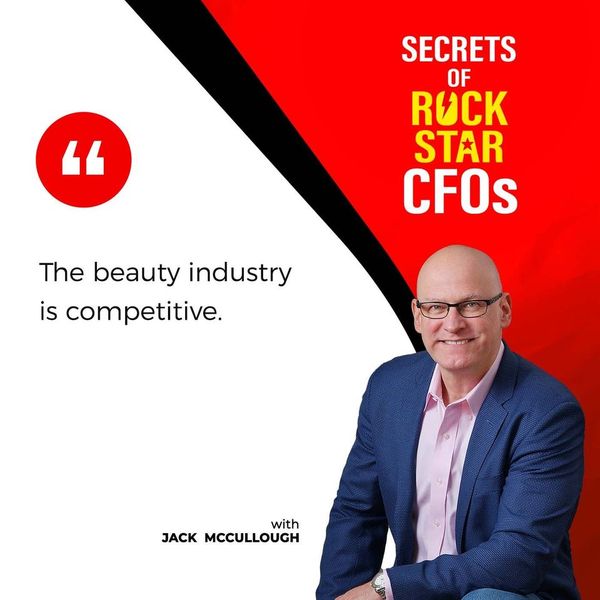
There was a lot of learning that I hoped we would keep with us. There was no playbook sitting in Johnson & Johnson that says, “This is how you separate a $15 billion business.” We made decisions with imperfect information and had the courage to correct it once we found out that it was wrong. I sit here knowing that we didn’t get everything right, but I have a hard time thinking what we got dramatically wrong. It is a testament to the team, where they wanted to solve problems. They were engaged. They got it done in record time. It’s why people who do this for a living, like Goldman Sachs, JP Morgan and EY, are saying, “This is the new gold standard.”
I take a lot of pride in how the team was able to react. The organization was multifunctional. It spanned all parts of our organization, and people were committed to it. The one thing that maybe I did was make sure we weren’t going to lose sight of that timeline. We set out several months as an aggressive timeline. We were told by the banks that it’s aggressive. I worried about project fatigue. You think about these things. When they get long in the tooth, people start to lose interest. When they can see a light at the end of the tunnel, that’s mostly beneficial.
It was also beneficial for the Kenvue team. Early on, they said, “We want to get on with it. We want to be our own company.” From that standpoint, continuing to drive the team and making those decisions with imperfect information would serve us all well in business. The one thing we have now is too much information. I don’t need more data. I need the right data. Focusing on that and putting your neck out there, say, “I’m going to take two steps. If I have to take one step back, I’m still a step ahead. That’s not a bad result.”
I love your analogy of Phil Jackson. He’s undoubtedly a great coach. I’m not about to suggest otherwise, but having Shaq and Kobe or Jordan and Pippen on your team could make a lot of people look like good coaches.
That’s what happened here, Jack. I have 1 or 2 of them. I had a stable of folks.
You need that. It’s not like there are a lot of other companies that have done anything similar at that size. There’s no blueprint you can look up. You’re figuring it out as you go.
That was the scary part, but it was also the fun part.
You’re building a plane while flying it. It is the saying go.
You had to run the other $85 billion of business without missing a step.
You’re on the board of Kenvue. Is that correct?
That’s correct.
You have an awful lot going on. You’re the CFO at one of the biggest companies in the world. You’re on the board of Kenvue. You’re on the Stanford Medicine board of fellows. You do a lot of philanthropic stuff within J&J. From what I know about you, you’re a family-centric guy. What’s the magic here? How do you do all of these things and balance it all? Everybody talks about work-life balance. If you could do it, we all can do it.
I don’t know, Jack. Everybody is busy. Everybody’s got their priorities. Everybody’s trying to do many things. I don’t consider myself unique in that regard. That last point you made about family is critically important. My wife understands the dynamics of the job. We understand together that balance doesn’t mean this. For those who can’t see me, I’ve taken my hand, and I’m going in a straight line. There are peaks and valleys. When you see that there’s going to be a valley in terms of your workload, take advantage of that moment, do stuff with your family and realize that balance is going to come over time. It doesn’t mean it’s calm seas all the time. That’s been helpful from that perspective.
My wife and I became grandparents twice over in the last several months. I couldn’t be more pleased. That puts a completely different perspective on life, and they’re a ton of joy. I’m ensuring they’re happy. At this point in my career, being blessed with working with good people, whether it be in finance or outside of finance, helps you manage any of the stress that comes with the imbalance that may come with the job again. Everybody is busy. Everybody needs to figure it out and know your limits. Don’t let the highs get too high, or the lows get too low.
I would like to conclude these with a couple of things. First of all, Joe, do you have any fun facts or things about you that people who don’t know you might find surprising or even like a favorite joke?
I had the benefit of having a high school accounting class before I went to college. I had my college accounting classes at 8:30 in the morning. There used to be an over-under bet on how many times I would drop my pencil because I was sitting towards the front of the class. When I dropped my pencil, that meant I was dozing off. My buddies were always miffed at how I could get A’s on the exams. They stayed awake and got C and C+. I had the benefit of having a precursor to my high school career. I always got debits towards the door and credits towards the window. It worked out for me that way. I was fortunate. That would be my fun fact.
What’s some advice you can impart to the next generation of CFOs?
I’d parse it into three categories depending on where somebody is in their career. For those more early in their career and mid-career, take those roles that are going to scare you. Some of the best roles that I’ve had throughout my career were the ones that I woke up that first day, looked in the mirror and said, “What the heck did I get myself into? How am I going to figure this out?”
What you’re going to find is that you figure it out. It’ll give you confidence for the next time you’re placed in that position, and you learn a ton. You meet interesting people along the way. Taking those roles that you know you can do is a waste of your time. Take those roles that will stretch you. I’ve been fortunate. Here in AMETEK, people had the confidence to say, “Joe, you’re ready for this role. Even though it looks like a stretch on paper, we have confidence in you.”
The second one applies to all phases of a career. I’ll use yet another sports analogy, Jack. It’s golf. Play the course. In this world of social media, it matters how many likes you get, what you don’t like and what other people are doing. Don’t worry about all that stuff. Play the course like golfers do. They don’t worry until it’s the last hole of a four-day tournament as to where they stand on the leaderboard. They play the course. They try to par or birdie every hole.
You continue to do that. You’re going to hit some bogies along the way. That’s okay. You learn from those and move on. Stay the course and don’t get consumed with, “Mary got this job. Jimmy got that job.” Are you being developed? Are you stretching yourself? Are you engaged in what you’re doing and loving what you’re doing? It is critically important.
The last thing I would say is to be curious. A lot of time, it’s not having the right answer. It’s asking the right question, listening more and understanding the assumptions and the fact pattern. Maybe this is the pseudo-lawyer in me, where sometimes I like to play devil’s advocate and ask questions, even though I agree with what the team is saying. What if we looked at it from the other side?
You go to Lincoln. In the book Team of Rivals, he staffed his cabinet with people who weren’t politically aligned with him. He knew he had the final decision and the final say, but he wanted to be as well informed in that decision as he could be. It’s courageous. It’s much more the role I play than jumping into spreadsheets and PowerPoints. I’m sure my team would tell you he still jumps into spreadsheets and PowerPoints way too often. It’s about asking the right question and making sure that the team gets to an informed decision based on the assumptions that we have at the time.
Joe, I know you’re a busy dude. I do want to thank you for coming on. This is going to be an invaluable episode. Thanks so much for joining us.
Jack, it was a pleasure. Thank you for having me on. It’s been an honor.

